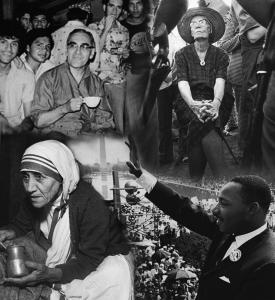If we were playing a game of word association and I said the word “saint,” what would be your immediate response?
It doesn’t count if you say your own name….
Most of us would eventually call to mind Mother Teresa, of course.
Known in the Catholic Church by her official title, Saint Teresa of Calcutta, Mother Teresa was an Albanian-Indian Roman Catholic nun and missionary. Her service to the church eventually led her to India, where she lived for most of her life.
The Missionaries of Charity is the religious order Mother Teresa founded in 1950. Missionaries of Charity run homes for people who are suffering and dying in 133 countries, working to alleviate poverty in any expression.
Now, starting an order like this sure sounds saintly. And, indeed, in addition to many other honors including a Nobel Peace Prize (1979), Mother Teresa was named a saint of the church on September 4, 2016.
Yes, Mother Teresa is what I think of when I think of a saint.
Today we mark All Saints Day in the liturgical calendar. And we’re a jumbled lot of people of some faith, a lot of faith, no faith—we all understand sainthood a little differently. But today it’s worth remembering how our ideas of sainthood have evolved. Recall:
In the first 300 years after Jesus lived on earth, a saint was someone who lost his or her life for the cause of Christ. We know these folks as martyrs and their willingness to give up their lives for what they believed was the foundation of this fledgling movement called the Christian church. Church father Ignatius said, “the blood of the martyrs was the seeds of the church”.
Around 300 it finally became cool to be a Christian and no one was getting killed for the cause of Christ anymore. So, to be a saint during this time in history was pretty synonymous with being famous. If you died a famous person and had enough money, a chapel would be built in your honor and people could come to your chapel, light a candle and pray to you—hoping of course that your success on earth would translate into a particularly close relationship with God, you know, up there. For 1300 years that’s what it meant to be a saint.
Next, the Catholic Church put an official process of canonization—the process of naming a saint—into place. This process must begin at least 5 years after a person’s death and involves a complicated investigation of a person’s life, approval by a panel of theologians and church leaders, and evidence that the person performed a miracle before and after his or her death. That’s all! This process remains in place today, but in the Protestant tradition we have adopted another idea of sainthood, one that came out of the Reformation.
When Martin Luther started causing trouble for the church and the Reformation began, the idea of praying to saints fell out of vogue among his group of radicals. And so, the concept of sainthood changed again. This time a saint became someone in your life whom you loved who had died. Family members, like mothers, sisters, brothers, grandmothers, etc., who died and went to heaven before us were now known as saints—sort of like scouts who got to the end of the trip first and were saving us a spot.
Most of us think that way these days. In fact, today our nave is lined today with pictures remembering people who have been saints in our lives. My brother John is up there, and I’m sure he’d be amused to be listed among a group of saints. But John was to me: a presence of love that I feel still to this day. That feels like a saint to me.
And I want to live a life like that, don’t you? A life when, after I’m gone, someone might remember a loving word I said or a care-filled action I took. But the problem is: I can assure you, I’m no saint. Most days, I’m just trying to make it through the hard work of being human, and I often fail miserably. And the strain of looming inadequacy threatens to overwhelm me…the thought of trying to be saintly is a bit terrifying.
The scripture text that frames our consideration of sainthood this morning is a familiar one—the Beatitudes, they are often called—a part of what we know as the Sermon on the Mount. Picture this: Jesus has gained quite a following among the common folks. Crowds gathered around to hear what he had to say. His disciples, confused fishermen for the most part, were standing there watching, taking at least mental notes so they could remember later what Jesus said. After all, they were all used to hearing lists of rules, instructions for how one would go about making God happy, being holy, maybe even achieving a status something like sainthood….
And so, Jesus spoke the Beatitudes: “blessed are the poor in spirit, for theirs is the kingdom of heaven, blessed are those who mourn, for they will be comforted….”
Robert Schuller, remember him? Popular televangelist, host of The Hour of Power, founder of the Crystal Cathedral, and prolific writer over the last forty years—he died in 2015. Schuller wrote a book on the Beatitudes and called it The Be Happy Attitudes—I do not recommend that you read it. The point of the book is that with the Beatitudes, Jesus was, in fact, giving us a list of things we needed to do to be holy—to be saintly. Just follow the list and you’re set!
The thing is, I am not so sure that the Beatitudes are a list of how one might take the fast track to sainthood. As one commentator on the text points out, “I’ve been around enough to see the merciful get trampled, the mourners commit suicide, the pure in heart walk away from God, and people who hunger and thirst for righteousness sometimes die of hunger and thirst.” (Mike Baughman, The Hardest Question Blog).
Instead of a list of directions, I wonder if the Beatitudes weren’t just what the words say that they are: a blessing. I wonder if Jesus didn’t look out over that crowd of hurting, oppressed, tired, hopeless people, and know that giving them yet another list to accomplish wouldn’t be much help to their desperation. They were people longing for a life of following God—if they weren’t they wouldn’t have turned up in droves that day to hear what he had to say. But life was hard, and circumstances were punishing. They didn’t need more rules; they needed a blessing.
And so, to aid them in their quest for sainthood, for lives lived reflecting God’s grace and love, Jesus raised his voice and he blessed them.
All of them. The whole crowd. In all of their desperation, poverty, powerlessness, pain…in their quest to live lives that mattered, to please God even with the limited resources and unlikely success they had, Jesus blessed them.
I said it was Mother Teresa who comes to mind when I think of what it means to be a saint. Taking vows of poverty and chastity, spending her whole life in the middle of abject despair and pain… that takes a holiness I definitely don’t have.
But do you remember why Mother Teresa has stayed in our awareness since she died? In August of 2007, Time Magazine published an article in entitled, “Mother Teresa’s Crisis of Faith.”
It was shocking news to everyone that in a collection of her correspondence it became clear that for decades, Mother Teresa felt no presence of God in her life. Writing to one of her confessors toward the end of her life, she wrote: “Jesus has a very special love for you, [But] as for me, the silence and the emptiness is so great, that I look and do not see,–Listen and do not hear … I want you to pray for me.”
This is the same woman who said:
“If we have no peace, it is because we have forgotten that we belong to each other.”
“There are no great things, only small things with great love.”
“Yesterday is gone. Tomorrow has not yet come. We have only today. Let us begin.”
…this woman had trouble believing that God even existed some days. And she is…a saint.
It’s easy to feel rather desperate about our own personal pursuits of sainthood, to think that we’ll have to be long gone before we ever have a shot at saintly status. But if we listen to Jesus’ blessing today, we might begin to realize that chasing sainthood is part of who we are as Christ-followers. And we’re living the life of saints, pointing people toward God, even here and now. Even as we struggle.
Today we give thanks for those who have gone before us; we’re grateful for their examples and their faithfulness. But being saints is more immediate for us; it’s something we’d better attend to right here and now and not wait for the rosy memories of those who love us to reconstruct our witness after we’re gone. Sainthood is a way of life, a way of living out our faith together, right now.
We’re called saints not because we’re particularly or exceptionally holy, but rather because we’re followers of a God who is holy.
So receive the rich and powerful blessing of Jesus today:
You are blessed if you are poor in spirit—not that holy.
You are blessed if you are trying to live with grief.
You are blessed if you are meek—putting others first.
You are blessed if you wonder about whether God exists and what all of this means.
You are blessed if you are merciful to those who don’t deserve it.
You are blessed if you are pure in heart.
You are blessed when you try to make peace.
You are blessed if you are ridiculed when your way of living flies in the face of what’s normally acceptable in our society.
Can you find yourself anywhere in that blessing of Jesus? I sure can. So on this All Saints’ Day we must remember that WE are the saints, living and breathing reflections of God’s love for this world. As we struggle toward sainthood, we’re chasing, not special status for ourselves, but God’s biggest hopes and dreams for the whole world.
And in our trying and failing and trying again, we are not alone. Today Jesus stretches out his hands, looks at us—all of us, and calls us blessed. Today, receive this blessing. And remember the words of one who struggled to sainthood herself: “Yesterday is gone. Tomorrow has not yet come. We have only today. Let us begin.”
Amen.













